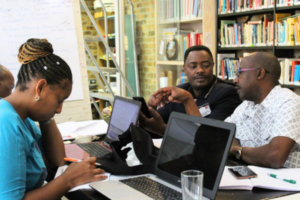A worker and laptop screen with AI generating task.
As generative Artificial Intelligence (AI) continues to capture headlines, with warnings of potential job cuts and dramatic shifts in the workforce, the stakes for workers could not be higher. While tech CEOs, venture capitalists, and economists frequently weigh in, workers must be at the forefront of this conversation. In this interview, an extract from the Brookings Metro Blueprint podcast, Christy Hoffman, General Secretary of UNI Global Union, shares a trade union perspective on navigating the AI revolution.
From her beginnings as a shop steward on a factory floor to leading one of the world’s most influential unions, Christy Hoffman brings a tested understanding of technological change and worker advocacy. She has firsthand experience negotiating around technology, having been part of a team that established a new technology clause over 40 years ago.

"Technology is way more successful if it’s done together with the workers who are going to be using it."
Christy Hoffman, General Secretary of UNI Global Union. Tweet
What does generative AI mean for your diverse membership, which spans sectors from tech and call centres to banking and media, and how could it either exacerbate inequality or do the opposite?
While there are big differences across countries and sectors, some common themes emerge. Everyone, even those with less immediate concern, feels some fear about what the future holds. The concern is that AI will reduce their autonomy, replace them entirely, or lead to a loss of livelihoods and way of life. The current hype and exaggeration about job disappearance only heighten this anxiety.
However, the most important thing for workers is confidence that they will have a role in how AI is implemented. If workers participate in these decisions, AI can be an opportunity for increased productivity, better wages, and potentially even a shorter work week. Certain sectors are particularly vulnerable, such as customer service workers who are already experiencing staff reductions. Banking and media workers are also very nervous, though these are two sectors deeply involved in collective bargaining.
The key is that unions must demand seats at the bargaining table with employers to secure commitments on notice, consultation, and other relevant job-related information.
You highlight that workers in the US often feel more anxiety than their counterparts in the same sectors in other countries, largely due to different policy and institutional environments. Can you elaborate on models like Germany's, which seem to offer more worker protection, and contrast them with the US institutional setup?
Works Councils in Germany were established with the inherent requirement for employers to consult with workers on technological change. At the World Economic Forum last year, I proposed a three-month notice period for the implementation of AI. A representative from a German employer on the panel said that they could never achieve such a short notice period, as they are usually required to provide significantly longer notice to their Works Councils. This reflects an entitlement to resources for understanding the technology and strong transparency requirements. Works Councils can block the introduction of technology, but this rarely happens as there is a common interest in ensuring successful implementation. Contrary to the US employer myth that unions would make operations impossible, Works Councils, often alongside unions, are eager to make technology work, ensuring people are not harmed and are transferred or upskilled for new roles. This model is built into their approach to the changing work organisation.
In contrast, the US system is profoundly different, marked by low union density, particularly in sectors most vulnerable to AI disruption. We lack the concept of Works Councils, where employers and workers collaborate on technology adoption.
As the US invests heavily in AI, what does it mean to invest just as seriously in American workers? What is your message to policymakers?
As a trade unionist, I will never be persuaded that there should be alternatives to unions for addressing this issue. We need to focus on overcoming the challenges to bargaining in the United States, which requires political will, not just the talks about tech or health and safety committees.
Technology companies bear a responsibility to promote bargaining as a social good. It is an anomaly to champion AI’s progress while simultaneously opposing worker unions. In addition to strengthening bargaining rights, various legislative changes could lead to improvements:
Transparency and notice
Companies must be transparent about their AI implementation plans and give workers notice and the opportunity to provide input. This has proven effective in other contexts.
Cost of layoffs
In the US, it is too easy for employers to dismiss workers compared to Europe, where severance pay, notice periods, and consultation requirements are standard. There should be a mandate for severance pay in the US.
Incentives for retention
Companies should receive incentives to keep their employees during disruptions. This could include tax breaks for training workers in new roles or support for shorter work weeks. Maintaining employment should be a top priority.
Limit surveillance
Generative AI often comes with surveillance, which harms mental health and privacy. Therefore, legislation is needed to restrict this surveillance.
On-the-job training
Training is essential, but it should not be done just for the sake of training. It must focus on practical needs, particularly in labour management. Training should target jobs that do exist, and employers should be discouraged from simply hiring new, cheaper digital natives. We must ensure that job losses do not disproportionately affect workers who are not guaranteed to transition into newly created roles.
What does a 'just transition' look like for AI?
Like teachers who are actively using AI to enhance their jobs, many workers want to use this technology and see opportunities. But workers need to be part of the discussion and not constantly worried about their job security. Numerous studies show that technology is far more successful when developed and implemented collaboratively with the workers who will use it. Workers have valuable ideas, can maintain their humanity, and can help maximise productivity enhancements.
Engage with employers early to identify helpful technologies and collaborate on solutions before they are implemented. A Finnish banking union, for example, successfully transitioned its workforce to AI through a year-long process involving workshops and training, resulting in positive outcomes despite huge job changes. It is about trust. Trusting that workers desire the best for their work community, and that if you are working harder, you will see some benefits.
A “just transition” for AI means that when a job is lost, workers will be placed in new roles, preventing them from being left behind. The World Economic Forum predicts a net increase in jobs by 2030 (14% new jobs vs. 8% eliminated), but there’s no guarantee that those who lose jobs will find new ones. A just transition ensures that some individuals do not suffer disproportionately for the progress of others. Many employers successfully bring their workforce along, viewing them as partners rather than obstacles.
What advice would you offer a new shop steward, particularly in the context of AI?
I would say, ‘You can do it.‘ I tell young people this all the time. Unions have been negotiating technology for a long time, and we know that when workers are involved from the start, it is better for everyone. You don’t need to understand how a large language model works. You just have to rely on your instincts about what is fair.
The key message is no one wants to be monitored all day. If you work harder, you want to get paid more. These are the everyday issues that any shop steward will understand and be able to negotiate.
RELATED ARTICLES
Let’s talk AI
The future of work in the retail sector







